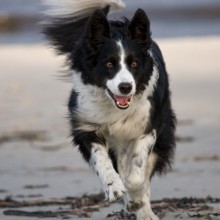Border Collie
Lifestyle Needs

The Border Collie is a highly intelligent working dog, whose job has been and still is, as a working sheepdog in the hills and mountains. He seems to have endless stamina, is loyal and faithful and able to think for himself when necessary. These qualities have also made him and excellent mountain rescue dog. He needs to live in a house with a large garden, ideally with proximity to the open countryside. He needs to be trained and given challenges to make him happy. He sheds his coat which needs careful and regular grooming. The Border Collie needs an owner who is willing to give him the time and challenges he needs, and has the energy to match his dog.
Genetic Diversity
(Known as Coefficient of Inbreeding: 'COI'. It should be as low as possible.)
The UK Kennel Club breed average COI is 4.0% - See 'A Beginners Guide to COI'
Gene Pool Size
(Known as Effective Population Size: 'EPS')
113.5
EPS is a measure of how many individuals are contributing genetically to a breed population. It is a measure of the size of the gene pool in a breed. Lower than 100 is considered critical by conservationists and below 50 brings a breed close to extinction. For more information see the Kennel Club article.
Health and Welfare Problems due to Conformation
(Body shape and physical characteristics)
None known
BVA/KC Health Schemes: www.bva.co.uk/chs
- Hip dysplasia breed 5 year mean score 11.2 (parents should be lower)
- Elbow dysplasia
- Eye Disease Collie Eye Anomaly (CEA) (litter screening); Retinal Pigment Epithelial Dystrophy (RPED) (annual testing); Primary Lens Luxation (PLL) (annual testing); Hereditary Cataract (HC) (annual testing); Goniodysgenesis / Primary glaucoma (G) (annual testing); Progressive retinal atrophy (PRA)
Estimated Breeding Values (EBVs) : EBVs for Hip Dysplasia are available for this breed
www.thekennelclub.org.uk/about-ebvs
DNA Tests Available
DogWellNet and IPFD Harmonisation of Genetic Testing for Dogs (HGTD)
www.dogwellnet.com/breeds
- Neuronal Ceroid lipofuscinosis 5 (NCL 5)
- Collie eye anomaly / Choroidal Hypoplasia (CEA/CH)
- Raines syndrome (dental hypomineralisation)
- Multidrug Resistance MDR1
- Imerslund-Grasbeck Syndrome (Intestinal Cobalamin Malabsorption) (IGS)
- Trapped Neutrophil Syndrome (TNS)
- Sensory Neuropathy (SN)
Availability of a DNA test does not mean that it is always necessary or even desirable for breeders to use this test.
Other Breed-Specific Health Screening Schemes
- BAER test for deafness
Ask the breeder to show you the certificates for the above tests/screening for both parents. If any of the above tests have not been considered necessary by the breeder (and there may be good reasons), ask her to explain why.
Other Diseases Reported
(For which there are currently no genetic or screening tests for sire or dam)
- Epilepsy
- Border Collie Collapse
Ask the breeder about the medical history of the parents, grandparents and great grandparents. Consider carefully whether to purchase a puppy if some of these or other diseases are in the family line.
Ask about the breeder’s policy in cases of serious genetic diseases occurring to your puppy in later life. Good breeders will request to be informed of such events in order to improve future breeding decisions.
You are strongly advised to buy from a breeder who uses (or is prepared to use) the AWF Puppy Contract and Puppy Information Pack (PIP): www.puppycontract.org.uk
The breeder should also be familiar with the CFSG/DBRG Code of Practice for Dog Breeding